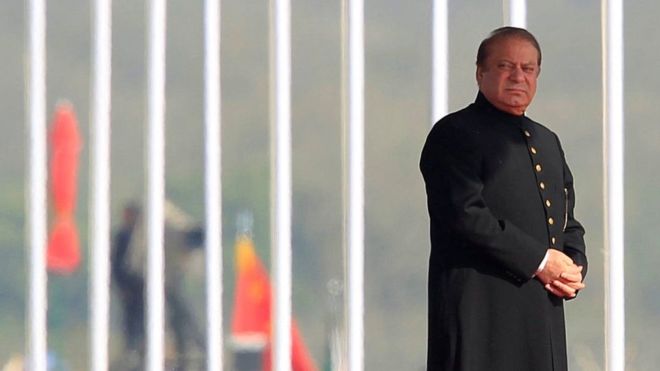Pakistan’s Supreme Court has ruled there is insufficient evidence of corruption to remove Nawaz Sharif from the role of prime minister.
It instead ordered a further investigation into money transfers.
Questions arose over the business dealings of Mr Sharif’s family when three of his children were linked to offshore accounts in the Panama Papers leaks in 2015.
Mr Sharif and his family have denied any wrongdoing.
They have dismissed the claims as politically motivated.
The case has made headlines in recent months amid predictions it could determine the future of PM Sharif.
About 1,500 police officers were deployed around the court in Islamabad. Protesters nearby urged Mr Sharif to step down with shouts of “Go Nawaz, Go Nawaz”, Reuters reports.
Stocks rose following the highly anticipated decision on Thursday.
The Supreme Court agreed to investigate Mr Sharif’s offshore wealth late last year after opposition leader Imran Khan threatened street protests.
The focus of the probe was on the funds used to purchase property in London using offshore companies.
Mr Sharif’s daughter Maryam, tipped as a future political star, and his sons Hasan and Hussein are implicated in the allegations.
Mr Sharif says the wealth was acquired legally. But his critics have suggested offshore companies were used to launder illegally-obtained wealth or avoid taxes.
The Supreme Court’s five-member bench was split on Thursday, with two judges voting against the prime minister but three choosing instead to order a further probe.
Mr Sharif’s party, the Pakistan Muslim League – Nawaz (PML-N), hailed the decision and his daughter Maryam tweeted: “Praise and glory be to Allah alone.”
Investigators will now focus on how the family members transferred money to Qatar.
PM Sharif and his daughter told the Supreme Court last November that their London property was bought through investments in companies owned by the Qatari ruling family. But the opposition in Pakistan has dismissed the claims as “fake”.
The so-called Panama Papers – 11 million secret documents leaked from Panama-based law firm Mossack Fonseca – set out the offshore financial activities of political and business leaders and the wealthy elite around the world.
There are legitimate ways of using tax havens and offshore companies, although these entities are often used to hide the true owners of assets or avoid paying tax on the money.
Source: BBC



